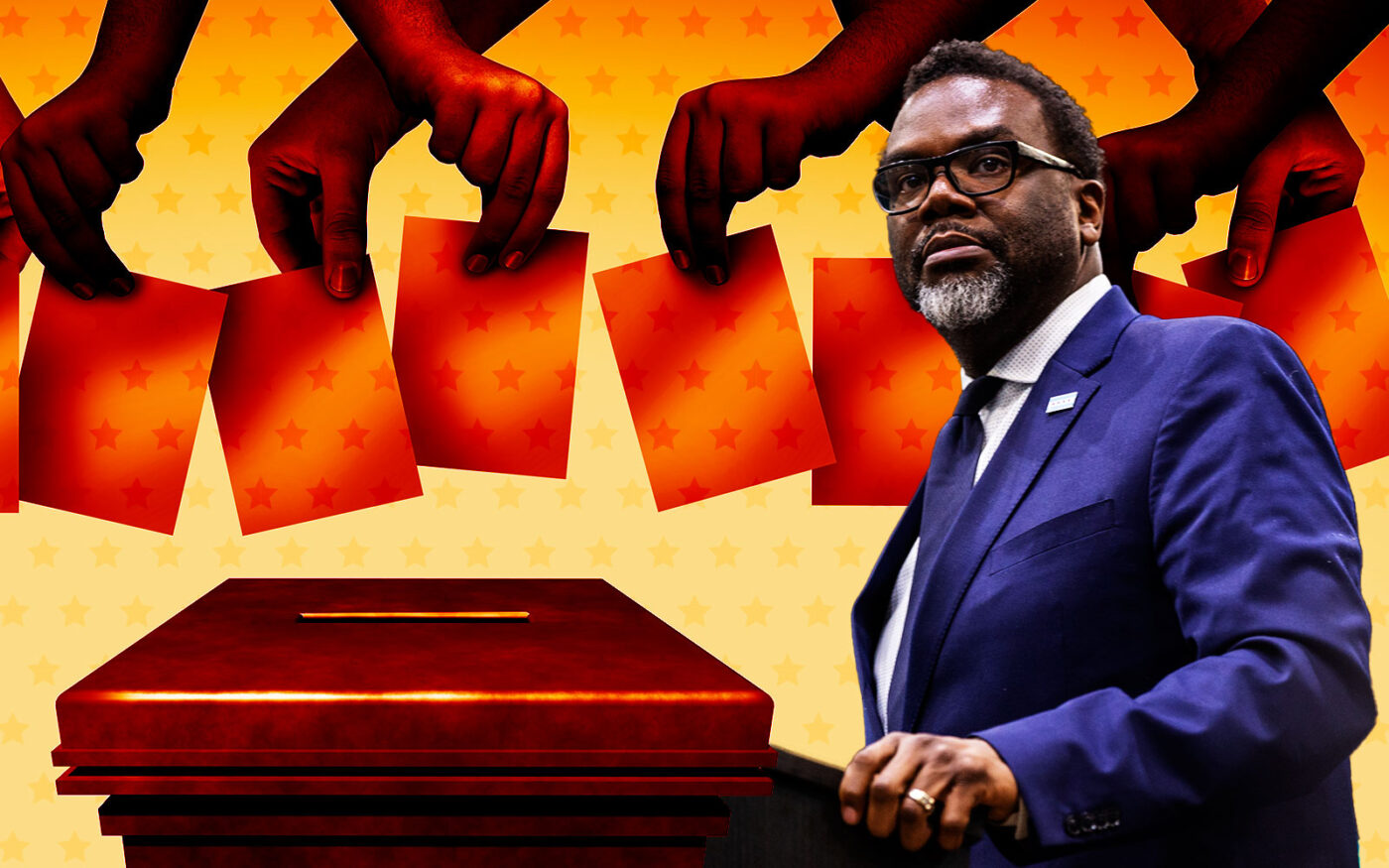Chicago’s real estate industry was dealt a gut punch Wednesday as Mayor Brandon Johnson’s transfer tax referendum was reinstated by an Illinois Appellate Court justice who overturned a lower court’s ruling that invalidated the ballot initiative.
The lawsuit filed by real estate trade groups will now go back before the lower court with instructions to dismiss it on the grounds that the court has no jurisdiction to invalidate the ballot question, which seeks to raise taxes on property sales of $1 million and more. That outcome could potentially be altered, if the industry trade groups that filed the lawsuit and won a ruling at the lower court to suppress votes on the measure decide to appeal to the Illinois Supreme Court.
“We are disappointed in the outcome of this case, but felt it was important to challenge this misleading and manipulative referendum question,” Farzin Parang, head of the Building Owners and Managers Association, said in a statement. His organization led the lawsuit attempting to invalidate the measure.
“This massive tax increase would hurt homeowners, renters, union workers, and businesses throughout the neighborhoods,” Parang said. “Even worse, a yes vote on this referendum is a vote to deliver huge blank checks to the city with no plan for how millions will be accountably spent. We have already ramped up our efforts to educate the public about the negative impacts of this tax increase.”
Justice Raymond Mitchell agreed with appeals filed by City Hall and the Chicago Board of Elections, which claimed that a Cook County Circuit Court judge did not give her own analysis in granting a request by trade groups to invalidate the ballot question. Justices Freddrenna M. Lyle and David R. Navarro concurred with the reversal.
“Like the parties, we are left guessing as to the bases for the circuit court’s ruling because the lower court gave no reasons for its ruling,” Mitchell wrote in his opinion issued Wednesday afternoon. “Rather, the circuit court read the parties’ briefing verbatim in open court and then made its oral ruling.”
The decision adds urgency to real estate industry groups’ campaign against the measure, which is set to be decided in the March 19 election. Illinois Realtors CEO Jeff Baker said the opposition was continuing with $1 million in funding dedicated toward getting out “No” voters even while the lower court’s ruling was intact.
The trade groups led by Parang’s organization filed a complaint against the Chicago Board of Elections claiming that the city’s referendum asking voters to hike the one-time tax on property sales of $1 million or more while decreasing the tax on properties sold for less than $1 million violated the Illinois Constitution and Illinois Municipal Code.
Cook County Judge Kathleen Burke ruled in favor of the trade groups in a Feb. 23 hearing. She granted their request for a judgment to suppress votes on the measure and denied a petition filed by the Board of Elections to have the case dismissed. She also denied a request by the city of Chicago to intervene in the case on the grounds that the trade groups had filed suit against the wrong entity, and the city should have a say in the fight.
The city and the Chicago Board of Elections moved to appeal these rulings almost immediately, and received an opinion from Mitchell Wednesday that overturned Burke’s decision and remanded the case back to the circuit court, according to his opinion.
“Nothing in this decision is intended to suggest that we have any opinion one way or the other on the merits of the referendum at issue,” Mitchell wrote at the end of the opinion. “That is a question wisely entrusted not to judges but to the people of the city of Chicago.”
A spokesperson for the Chicago Board of Elections issued a statement Wednesday confirming that, for now, all votes cast for the citywide question will be counted and reported by the board on March 19.
“I’ve said all along that the people of Chicago should determine how we address the unhoused crises in Chicago,” Johnson said at an unrelated press conference Wednesday. He made raising the city’s real estate transfer tax on properties sold for $1 million or more a major campaign promise last year.
“Organizing in this city is a major part of what has helped transform our city over the course of decades,” Johnson said. “That history is still intact. I’m encouraging everyone to vote in this upcoming election cycle.”
Despite Burke’s denial of the city’s motion to intervene, Mitchell agreed with arguments made by attorneys for the city that it had a “direct and substantial interest” in the case and said it would be “unfairly prejudiced” by the circuit court’s judgment if not allowed to participate.
Mitchell even said that Judge Burke had committed “an abuse of discretion” when she denied the city’s motion to join the case, saying that the legal threshold to let the city intervene in this case is relatively low and that it was met by the city’s attorneys.
Home rule municipalities like Chicago are required to get approval from voters through a referendum before raising the transfer tax, but plaintiffs said including a decrease in the referendum along with the increase made it unlawful.
Mitchell ruled that this legal challenge was brought forward prematurely because Illinois courts have a long history of declining to interfere with matters that are part of the legislative process. This, he writes, is crucial to the “separation of powers.”
It is not the court’s jurisdiction to rule on the “validity of legislative enactments” until after they have been enacted and Burke was wrong to have done so, Mitchell wrote.
That means the circuit court could potentially be within its bounds to prevent the transfer tax measure from going into effect, should voters pass it and a new lawsuit gets filed after the election that persuades a judge the ballot measure wasn’t legally posed.
If passed by a simple majority of voters, the referendum would increase the real estate transfer tax imposed on sales of more than $1 million to fund services for people experiencing homelessness, including quadrupling the 0.75 percent rate the city currently charges for deals over $1.5 million.
Under the proposal, the rate would drop to 0.6 percent for property trades less than $1 million, affecting the majority of local home purchases. Advocates of the plan estimated that upward of 95 percent of sales would get a transfer tax decrease. They also estimated that the tax would generate an additional $100 million in dedicated funds for homeless services each year.
“Our longstanding coalition of policy advocates, service providers, labor unions, and homeless and formerly homeless people commend the judges of the First District Appellate Court for dismissing the real estate lobby’s effort to invalidate Ballot Question 1,” said Maxica Williams, chair of the End Homelessness Ballot Initiative Committee and board president of the Chicago Coalition for the Homeless, which has supported the referendum.
“We look forward to keeping up our efforts to reach hundreds of thousands of voters about their opportunity to vote yes for a fair and sustainable plan to fund housing, care for the homeless, and ask wealthy real estate corporations to pay their fair share,” Williams said.
Read more



